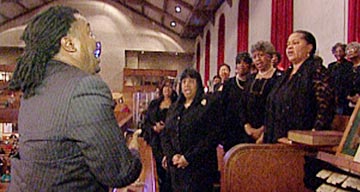Cybercolumn by Jinny Henson: Being Jesus to the Uncrustable Generation
Posted: 8/24/07
CYBER COLUMN:
Being Jesus to the Uncrustable Generation
By Jinny Henson
Peanut butter and jelly. The combination of this salty-sweet concoction was first documented in World War II. Soldiers mixed jelly in their peanut butter rations to make swallowing easier. Returning from the war, these heroes brought back victory as well as a taste for these sandwiches.
Then in the late 1960s a combination of kitsch and kitchen hit the market with the culinary triumph: Goober. I never acquired the palette for Goober. The flavors far too prematurely intermingled. Like day-old nachos or wet beach towels in the car. It just never jived in my mouth. Obviously it jazzed someone’s taste buds, as the product born the year before I was remains a staple in grocery stores across the country.
| Jinny Henson |
Fast-forward three decades. In the year 2000, jelly giant Smuckers rolled out the crustless peanut butter and jelly sandwich, flash frozen for freshness: The Uncrustable. Birthed by a time-strapped culture, Uncrustables are now available in four flavors and dethaw right in your child’s lunch box for convenience. When even more pressed for time, I have found that popping one under each armpit with wrapper intact is a great way to hasten the defrosting process.
From humble, foxholistic beginnings to futuristic perfection, the peanut butter and jelly sandwich, like most institutions in our society, has undergone radical change. How can we who are passionately in love with God and passionately committed to loving people find a clue through the most mundane means of a PB&J? A mere glance at The Uncrustable will give us tremendous insight into how we can translate God’s love and timeless message into a language this generation can bite into.
• Speed.
A survey of grocery store shelves is all you need to recognize that time is increasingly the most valuable commodity in postmodern America. Along with the birth of convenience foods, there is an entire section of cleaning products in wipey form. Even the act of spraying the Windex on the window has been streamlined for time efficiency. In a July 2007 Harris Interactive study, 98 percent of parents said it is important or very important to spend quality time with their children, while just about half actually said they spend enough time with their children.
• Variety.
A church that offers a variety of activities at numerous times is one way to involve the Uncrustable generation. Also, leveraging time-saving technology instead of being frightened by it is an excellent way to show pertinence to people who view the church as passé or irrelevant. Quality websites that are actually maintained, e-mail reminders, and e-newsletters in addition or instead of printed ones are simple ways to connect.
• Fresh.
My husband, John, and I got a flyer for a church that talked about how boring church services can be and how their church was breaking out of the “tired, churchy,” mold. That message may have been compelling 15 years ago, but the “innovative,” message rang stale. The effective church constantly examines what is relevant culturally and what has been done and overdone already. Fresh is a great adjective to describe the quality that God’s Spirit brings to our lives. His Spirit is always ready to do a new thing—in us individually as well as the church corporately. Be open to fresh ideas to express God in a new way.
• Hygienically sealed.
Just as we want food protected from microorganisms tainting its safety, parents want the same type of protection for their children. True, parents cannot wrap their children in cellophane (I’ve tried. It never works.), but they do need reassurance that church is a safe place for their children. After a few seasons of, “To Catch a Predator,” you are convinced there is a molester at every keyboard.
Parents need reassurances about security policies in your children’s’ program that will help them relax and be moved by God’s message. When your church has a safety policy—like background checks for all teachers and workers and a security system for checking in children—that shows you are aware of the security risks. Parents want to know their kids are safe in the church, and measures like these go a long way to augment that good rapport.
Weary, time-strapped and looking for ways to make their lives better. These are qualities of this generation. The fields are white for the harvest, and I cannot imagine a more worthwhile place to spend your effort than reaching those people God has for your local body to reach. Go forth with the clues of The Uncrustable sandwich and be pertinent.
Jinny Henson travels the country as a Christian comedienne. John, Maggie Lee and Jack are an endless source of material for her. You can find out more about her at www.jinnyhenson.com
News of religion, faith, missions, Bible study and Christian ministry among Texas Baptist churches, in the BGCT, the Southern Baptist Convention ( SBC ) and around the world.





